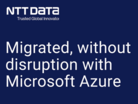NTT DATA & Microsoft Azure report: migration & supply chains

Cloud solutions are vital for organisations which want to digitally transform their operations. The vast-scalability of the cloud offers flexibility and resilience to manufacturers and it is reshaping the way applications are delivered.
Cloud technology supports manufacturers
As a market-leading hyperscale public cloud, Microsoft Azure is a great solution for manufacturers who need:
- Software as a service (SaaS)
- Platform as a service (PaaS)
- Infrastructure as a service (IaaS).
Microsoft Azure supports multiple programming languages, tools, and frameworks - both Microsoft-specific as well as third-party software and systems.
The Azure cloud platform comprises more than 200 products and services, designed to solve today’s business challenges and to help manufacturing organisations shape the future.
NTT DATA helps optimise Azure investment in manufacturing
Azure can transform the way a manufacturing organisation aggregates and uses information, and to ensure they get the most from their investment, many businesses are turning to companies such as NTT DATA, which offer a variety of services to optimise their Azure investments, such as cloud advisory, implementation and management services.
NTT DATA is a trusted global innovator of IT and business services with a 20-year track record of collaborating with Microsoft to deliver innovative, high-performance business solutions, providing strategy, implementation and ongoing support for the entire portfolio of Microsoft products – delivered by thousands of certified Microsoft consultants worldwide.
NTT DATA can identify gaps in a manufacturing organisation’s current systems, help it choose the best solutions and implement or upgrade technology as needed.
Now, NTT DATA has published a definitive report on the most effective ways that large manufacturing organisations can leverage Microsoft Azure not only to meet current corporate needs, but also to legislate for likely future ones.
Called ‘Four Keys to Successful Azure Migration for Large Organisations’, the report explores why so many businesses are unable to transition successfully from legacy systems because of financial and operational challenges.
The report highlights this trend most common in larger and long-established manufacturing organisations for several reasons.
It also shares four crucial keys to cloud migration that can help enterprises leverage Azure to realise their goal of increasing efficiency and productivity.
Microsoft Azure: Align technical and business needs
The report says the first key to successful Azure migrations is for migration teams to work closely with business units and support functions to set business goals in stone, so that technical solutions can be shaped to address these needs.
It also says it is vital that all stakeholders have a voice in the migration process, for goal-alignment purposes.
Microsoft Azure: Acquire the right knowledge and experience
NTT DATA’s paper stresses that, although moving to Azure will eventually result in greater output with fewer resources, the migration effort itself requires specialised expertise.
“Whether the skills come from inside your organisation or from a cloud migration partner, a professionally managed, measured approach will pay off in the form of a well-structured and cost-effective cloud architecture,” NTT DATA advises. “A poorly planned and executed migration will likely do more harm than good.”
Microsoft Azure: Stay the course
“A comprehensive Azure migration can demonstrate short-term results, but it is also a long-term journey,” the paper says, adding that businesses must guard against putting migration initiatives on ice, and against changes of direction.
Examples of things that might derail a migration, it says, might include exciting new technologies that promise to change everything, or a new executive with strong opinions and ideas.
“The winning strategy is to create a well-thought-out migration plan, commit to its principles, and get the job done,” the paper concludes.
Microsoft Azure: Develop a culture of constant transformation
Mindset is another vital area, says NTT DATA, pointing out that few of Azure’s benefits can be realised if employees do not accept the change.
“Modernisation and optimisation might be seen as unwelcome tampering by those who use those applications every day,” NTT DATA warns. “Organisations must focus on fostering an internal culture that embraces the idea of technological progress.
The more people understand how Azure will deliver better results, the more eager they will be to engage in a cycle of continuous learning and improvement.”
- The University Manufacturing Circuit Boards from LeavesSustainability & ESG
- Schneider Electric's Commitment to Sustainable ManufacturingSustainability & ESG
- Lenovo & Saudi Alat Building Green Manufacturing FacilitySustainability & ESG
- Nissan Brings Biodiversity to the Factory through RewildingSustainability & ESG


